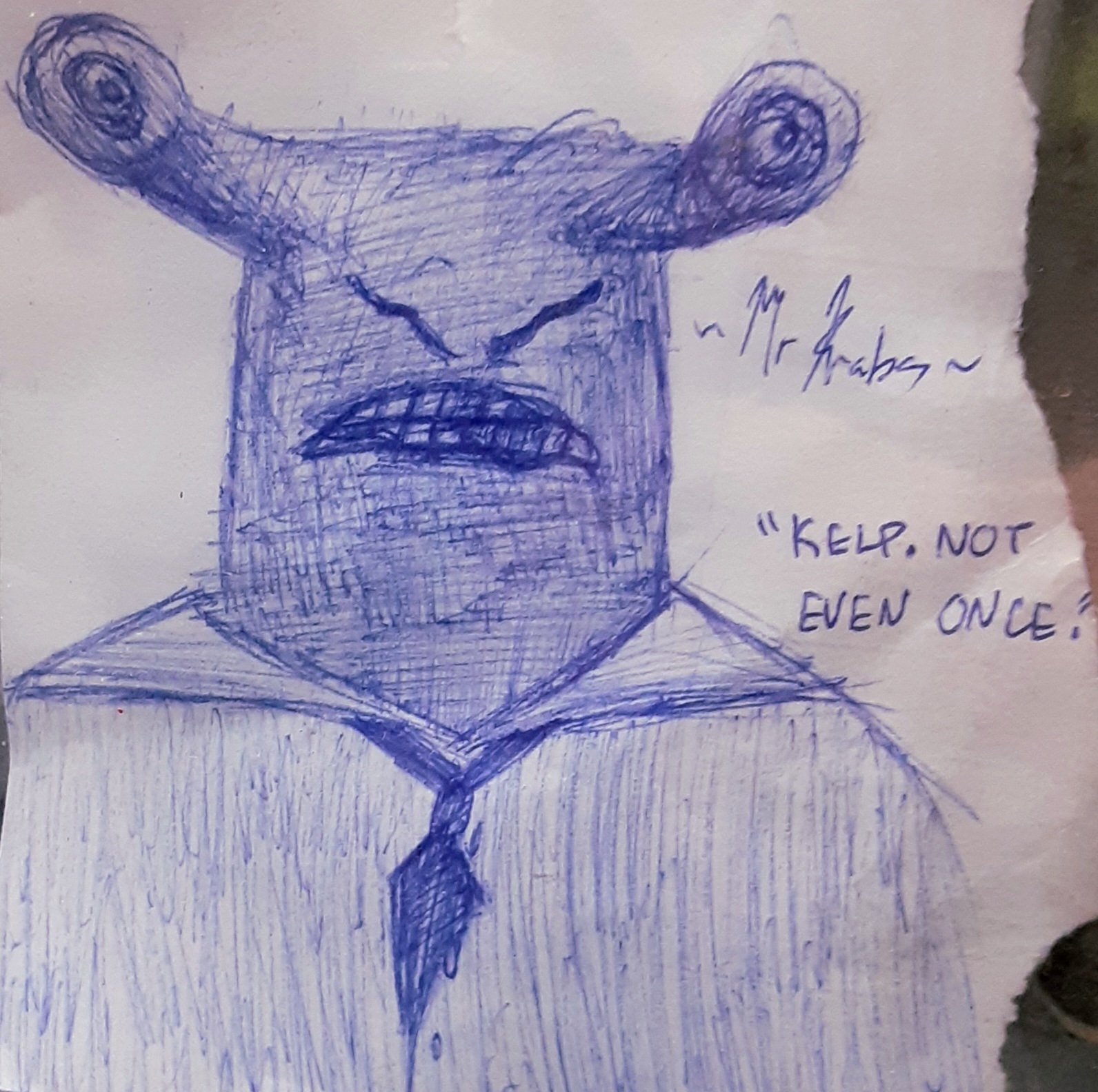In some of the music communities I’m in the content creators are already telling their userbase to go follow them on threads. They’re all talking about some kind of beef between Elon and Mark and the possibility of a boxing match… Mark was right to call the people he’s leaching off of fucking idiots.
I care. I’m just increasingly convinced it’s too fucking late.
It is. They know everything about you. Even every store you have shopped at knows a lot about you. It really doesn’t take much interaction for a company to get a lot of info. It’s relatively easy to get an email and from there, if they wanted, they can get the rest of your profile from a 3rd party who has your data all matched up already. They can also build your profile pretty easily themselves as well.
I think personal data poisoning is going to become more prevalent among privacy communities, I would like to see some tooling for this in the next few years.
Tbh it’s not black and white. I’m sure a big corporation can extract a ton of information on us but there’s still a pretty big gap between having our real names and photos plastered everywhere on social media, or them just knowing where I live and that I spend a lot on steam games. Don’t take the small victories for granted.
It might not be. Plenty of US states are coming online with privacy rights. If you live in CA, CO, CT or VA you can submit requests to opt out of information sales and for sites to erase your data.
Me. I care I just…fuck. That ship has sailed. I don’t go out of my way to download the big offenders like Tik Tok but…still. Everyone is tracking me. Everyone is selling my information. God knows how many different companies have massive files on me.
Even if you get them to care once you show them all they need to do to have a shred of privacy they shrug say something along the lines of “well I don’t have anything to hide anyways” and go back to their merry way. The path of least resistance will always win sadly
Literally saw a comment like that yesterday. Drives me up the wall. I’m in the process of accepting that the average Joe/Jane just doesn’t care about anything but their little bubble. I used to spend so much emotional energy on trying to convince people to stand up for something greater or to at least think more than 2 meters ahead, but now I’m just done. I’ll watch out for myself and the people close to me, everyone else can just evaporate for all I care.
Congratulations, you now have your own little bubble.
I literally just had a friend tell me he joined Threads and how neat it was, etc etc and when I explained why I wouldn’t be joining him, he basically just gave me the old “Well I already know they have all my information so it doesn’t matter”
…like wtf? So you just…give up having any privacy whatsoever? I just couldn’t respond to him after that, I don’t really know how to respond to that. There’s a disease spreading in the world unfortunately and it isn’t just COVID. It’s one called Apathy and too many people are coming down with it.
I’m just curious if you’re a tech worker? (or a teenager interested in tech)
I ask because I feel like people who work in tech are basically exposed to the dangers of web privacy all the time. I remember having to implement a facebook pixel on a website, and realizing the network of surveillance that facebook have spread across the web at that time. So I have pretty decent privacy behaviors, still far from great but maybe slightly above average.
But when I go to the doctor and I mention how often I eat fast food and drink alcohol, or when I go to the dentist and admit I don’t floss everyday - I’m sure those people are thinking ‘most people seriously don’t care about their health’. They might stop short of ‘fucking idiot’, hopefully.
I’d also say that those health issues are much more practically impactful than Instagram showing you ads for luggage when you’ve bought a plane ticket.
Caring about ad tech is a hobby. It’s as good a hobby as any other, but that’s what it is.
Sure I think thats fair. My larger point is that everyone is biased over time by their hobbies and professions, and we should be careful how harshly we judge others by our yardstick.
You can be casual about it, but I don’t think it’s a hobby to seek to understand something that you’re very nearly forced to coexist with. I have to acknowledge there’s ideology behind statements like this, but it’s more analogous to knowing your enemy’s capabilities. It’s a necessary prerequisite to forming an effective defense.
But I’ve come to understand many people don’t share my antagonistic mindset. That’s fine, but they should still understand the interactions they’re having with these systems in even just the vaguest terms, because the effect on their lives is very tangible.
I’m saying the very idea that you need to ever even think about this as a defense against the enemy is the hobby. There’s only a battle to be fought here if you want there to be, and most people don’t want that. The impact on their lives is not actually tangible. Ad tech doesn’t really hurt anyone. No one likes it, and at best, it feels a little gross, but feeling vaguely icky is not the kind of tangible impact that reliably drives people to action. What happens to you when Facebook or Google bundle you into anonymized groups of eyeballs and promise advertisers that they’ll show you ads relevant to the profile they’ve built of you? Nothing really. If you think about the way they built that profile by tracking your every move online, then yes, it feels creepy, but that’s it.
i love a good analogy. point taken.
The Average person, in my experience, doesnt give a shit about their privacy…because they are stuck on the notion of “what do I have to hide? I didnt do anything wrong!” with a heaping helping of not wanting to give up convenience on top of it.
And all attempts to explain them that you dont have to have anything to hide for your privacy to be important and be protected fall on deaf ears and accusations that you, the one trying to protect them must be some kind of bad/evil/criminal person to be that concerned with privacy.
These people tend to be absolute delights to deal with when their shit gets stolen, and they expect everyone else to fix it for them.
Well okay, with my piracy habit perhaps I do have something to hide😂
But I also think most people don’t realise they do have stuff to hide.
Everything should be private by default. All this shit about nothing to hide is the opposite of that - trying to justify why something should be private. The question is rather why it should be public.
There companies profit enormously on our data and we get exactly nothing in return except the ability to use their service, under the conditions that they put in place. We have zero power to change anything at all about what they provide for us.
A user in that context is similar to a loser. Someone who has no ability to control what happens.
I keep seeing people saying “I have nothing to hide” is a bad argument. But no one ever explains why it is. So for the people who say they don’t care about the privacy, what would you say to them about why they should care?
Because everyone has stuff to hide. You dont have to have criminal activity, ongoing or in your past, to want to keep your privacy and keep things hidden. I always counter with “Okay, then lets paint your social security number on the side of your car if you have nothing to hide”, and they always stammer and stutter about how thats different and that would cause them no end of headache if someone got it and stole their identity.
And yes, thats the point. You have stuff you want to protect and keep others from knowing. Not just for identity theft reasons, but for social reasons as well… You probably don’t want your spouse to know how much you hate their sibling for no reason, or want your boss to hear what you say about them at home, You dont want people at the bagel shop to know your bank account number and password, Or any of a thousand other things that you do every day, that you dont want other people to know about.
Personally, I’ve always thought “They could sell your data to insurance companies who might jack up your prices or claim something is a pre-existing condition” to be the most p we persuasive to people like my parents.
tbf if you’re not american it’s better
But Facebook/Twitter/etc isn’t telling out boss what we say about them at home. Or our SSN to every car we pass. Or how much we hate it family-in-law.
Unless you give them realistic reasons, they will always counter with “That’s different” because it is.
Who knows what will be worth hiding in the future. Something that is nothing to hide today might get you in serious trouble in the future.
Some really good arguments. But here’s one from the Cyber Security side. We all know about the CIA, but do you know about the other CIA?
- Confidentiality – Information that you store or transfer is only readable to those you designate.
- Integrity – Information you store or transfer is only alterable by those you designate.
- Availability – Information you store or transfer is available to those you designate when they need access to the data.
Confidentiality is the heart and soul of a functioning life. You do have stuff to hide, even if you say you don’t. Do you want a rando to know your passwords? Do you want your wife to find out about your birthday gift to her before the big day? Do you want your nosy neighbour to start gossiping to the entire neighbourhood about what you and your wife did on her big day? Do you want that big secret plan that will make you the next Mark Zuckerberg be found out by the real Zuckerberg and now he’s rich and you’re not? All of these are things that aren’t illegal, yet are still private information that someone like you might want to make confidential.
And this isn’t even the tip of the iceberg. Sure, you might argue, you shouldn’t be posting your plans for the Zuck-killer on Facebook, but your actual words are not the only thing Facebook stores and analyses. They know a lot about you. What you liked. What you commented on. What you searched for. What you looked at. They know things about you that you never ever said. For instance, even if you never said “I’m a Democrat” in so many words, or even if you don’t share overtly political posts, they still know your ideologies and are willing to sell this information to everyone and sundry. Facebook is even building profiles on people who never created accounts on Facebook. Imagine being Republican and working for a Democrat boss. You’ve worked hard to keep politics out of the workplace, because while there may be anti-discrimination laws if you’re a woman or a minority, having an unpopular political opinion is not protected in as many places, so you could easily lose your job if Facebook discloses to your boss that you’ve not got the right political views.
If Confidentiality really was not an issue and everyone could live open lives without consequence, we’d be talking about the IAs of security, not the CIAs. That we are talking CIAs shows that yes, there actually IS a need for secrecy, and we actually DO have things to hide, even if we don’t moonlight as murderers, cat-burglars, or strippers.
PS: I don’t believe you have never had it explained to you why 'I have nothing to hide" is a bad argument.
PPS: Very strong sea lioning vibes here.
PPPS: Seems like this nonsense started cropping up on Reddit when it became clear the protests were having an effect. And now it’s here. So much dishonest debate tactics being thrown around the whole “we want an alternative to the creepily intrusive policies of main-stream social media” debate. I wonder why? </sarcasm>
OK, ngl that
{democrat|republican}rendering as democrat is pretty cool.
They probably don’t know what actually involves giving away their data and what actually concretely means. I’m a tech guy, developer, here in the Fediverse and neither I do know actually what it means. It’s the lack of information the problem. I could imagine it though, but it’s not the same thing. I could imagine that with my data big corps become more powerful, creating more addicting ads, contents and algorithms that eventually will fuck up the world even more. And that’s a nightmare, I know. Metaphorically it’s like intensive farming. “I eat meat because I love it and I can’t give up on it” and as soon as no one sees what actually happens to the animals inside those farmings, no one cares.
One problem is that it’s very hard to quantify how much our privacy, our data, is worth. There’s money to be made with it, but we, average people, have no idea how any of that works. This leads to general indifference.
Another problem I see is that most people don’t correlate their continuously worse online experience with being spied. Every facebook change led to lots complaints, but people didn’t quit, they just ate shit until they stopped complaining. Same with Twitter, Insta, Google, Youtube. Since the enshittification happens gradually, they fail to correlate one thing with another.
I really think this thread is a great example of why the average person doesn’t care that much.
The whole thread is full of comments like “the issues caused by giving away all your data are too abstract, too far away, or too difficult to understand”. This is true by the way, I completely agree.
But I haven’t seen a single comment trying to explain those possible issues in an easily understandable way. The average person (or, at least me) reading threads like this won’t learn anything new. Give me a practical issue that I might face, and if I agree that it’s an issue, I’ll focus more on avoiding that issue.
In other words, an example:
- Let’s say I’m a person using lemmy/mastodon, only using privacy-focused search engines etc.
- If I would now change to using facebook/threads, started using Chrome as my browser, etc the usual mainstream tracking stuff - what problems can this cause for me in the future?
PS. I do agree with the notion of “minimize the data you give away”, which is one reason I’m here, but I really don’t have an answer for these questions. I’m like “I understand the point of privacy, but can’t explain the reasons”.
If an algorithm knows exactly who you are, then it knows how you think, and it knows what sort of content will manipulate you politically. And right wing political content is profitable. It’s called the alt right pipeline. Most people have some kind of argument that will manage to radicalise them to any position you can name. Through correlative learning, an algorithm will look at how people like you changed their views, and it’ll send you down the same path. It’s easy.
Don’t you feel like awareness of it can be the number one thing to protect you from the manipulation that is rampant? I look at everything and say that is trying to change my mind. Unfortunately, with that comes this cynicism that I’m being sold to all the time and whatnot. But if I happen to hop on a browser that doesn’t have AdBlock, I don’t walk away having spent money on snake oil, or I don’t go sign up for my local right wing political action committee, because I’ve been made aware consistently that everything is aimed at getting me to give something.
And let’s be real, we all remember the constant reference to the Reddit hivemind. If we’re saying they’re wasn’t some sort of external influence that landed everyone on the same wavelength, that feels naive. Or I’m a cynic and can’t enjoy anything anymore.
No, awareness isn’t the number 1 protection, it’s the number 3 protection. The number 1 protection is actually having a nuanced understanding of the issues so that when propaganda tries to prey on your misconceptions, it can’t find any. And the number 2 protection is avoiding propaganda, because anything starts to sound persuasive if it’s repeated enough. Awareness is important, but it’s just not as effective as those two other protections. It has too many weaknesses.
I think that’s pretty well put and I’ll agree with it.
In spite of everything telling me not to I still pop over to Reddit because I think there is still value there, even if I have to wade through the bullshit and the bots and whatever. A couple subs weren’t infested with shit yet. But for sure it’s a risk assessment, and I think I got it, but probably I’m not as smart as I think.
This isn’t a plug, but it is a link to an article I wrote for exactly this reason. I tried to succinctly explain why privacy matters with real work examples and precedent.
Great content here, thanks
I remember back when Snowgen first leaked all of that imfo about government tracking. One show, either the daily show or colbert report, did an episode about it. Almost no one they talked to cared until they mentioned the government can also track your dick pics.
deleted by creator
Bad actors may use it to manipulate you or cause problems in other aspects of your life (HELLO data breaches!).
This is a hypothetical. Think about all of the normal stuff people could see about you on Facebook. Would you also want those strangers to have your other personal information and possibly passwords? How about your boss? School? Insurance agency? Bank? Someone who works at one of those places, and still remembers that information after they clock out?
Let’s say there isn’t a data breach. They also use that information to try to get you to click ads, even if those ads might be unsafe to click.
Please answer something for me. What is it that makes you think that Zuckerberg would act in your best interests? What would stop him from turning around, selling data again? How can you know that he will keep that data in trustworthy spaces, and away from bad actors?
I wouldn’t even give my own parents access to that level of information unless I absolutely had to. I’m certainly not happier about a stranger having access to it.
People do, but ease of use will trump it every time.
It’s a bit of a shock that simply picking an instance and signing up like any regular site is such a hurdle to so many people.
I think in Mastodon’s case it was less that you had to pick an instance, rather they were all instances from companies/people that they didn’t know. How many email providers does the average person know? The “my Mastodon admin can read all my posts” discussion also fits into this (they were fine with Twitter doing it). Threads will behave just like any other service in the Fediverse at the end, with all that “complexity”, but people will say Threads is easier, just because of the recognition factor and that they already have an Instagram account.
That last bit is part of it. One Instagram account means full access, full interaction. If you don’t have one there’s no approval process, either.
Plus it looks more fleshed out. Let’s face it, a clean and at least vaguely clear UI is far more trustworthy for 99% of people than a possibly sketchy one that seems to almost overcommunicate as far as they’re concerned.
Oh, and speaking of UI, the only app I have for Lemmy on iOS is through Testflight. Most people don’t have, want, or even need a desktop so if there’s no phone app then literally nothing else matters and that’s fair.
That’s the key, you have to figure out what instance is best for you. With a million choices you get choice paralysis mixed with FOMO and they just don’t bother.
IMO that’s probably the biggest problem with anything decentralized like this. The average person doesn’t care about the benefits and the above is by far a big barrier to entry.
The average person doesn’t understand modern technology even on a basic level. Most people don’t know what Free Software is or what end-to-end encryption is and you can’t have privacy without those two. And those things have existed for decades. What about more complicated topics such as cryptocurrencies or AI? It’s easy to see that most people don’t understand them either.
So when it comes to some basic aspects of modern technology, most people are decades behind. Sometimes I even meet software developers who don’t fully understanding those topics.
I even meet software developers who don’t fully understanding those topics.
As an operations side IT, I’ve met a lot of developer side programmers (even really good ones) that don’t understand computers in a functional sense.
That’s kinda sad. I think our education is just not good enough when it comes to IT.
True, it should really be a foundational course now, and not just “here’s Microsoft office” level shit. With more advanced stuff left to collegiate courses.
Both programming in a high level language like python and A+ level CompTIA type thing.
Sometimes I even meet software developers who don’t fully understanding those topics.
“Even” software developers? That’s kind of a weird thing to say. Programming as a discipline is far broader and deeper than most people realize (and that includes software developers!). Knowledge in one limited specialty does not translate automatically into knowledge in a different specialty and, indeed, can actively interfere with another domain without intensive retraining. (For a concrete example of this, just look at the abominations made in "embedded"1 programming by people coming at it from writing Yet Another CRUD-backed Web App.)
So it’s absolutely possible for someone who’s a real whiz with making web app front ends to have a very hazy grasp of security and privacy. It’s a peripherally-related discipline at best.
1 “Scare quotes” used because I don’t view what amounts to a PC running Linux in a funky form factor as meaningfully “embedded”.
I just expect programmers to know more about software. They should know those things at least on a basic level. They should be the ones to educate people about it, because otherwise who will do it?
If software developers don’t understand what end-to-end encryption is, what hope can we have that an average person will understand it? I just don’t know how we can make progress if even technical people don’t know technology well enough.
You missed the part about how large software is.
I could (and probably have worked!) my entire professional life in domains you’ve never once caught a glimpse of using kit you wouldn’t recognize. To me it’s trivially obvious how to, say, debug an SPI bus timing problem where you might not even know what an SPI bus is without looking it up in Wikipedia first.
(I guarantee you that within 3m of you there are orders of magnitude more SPI connections than any form of encrypted connections.)
Now the only reason I know what end-to-end encryption is and why it’s important is because I took a short break in my mainline career and worked on PKI for about six years. (I then ragequit commodity software and went back to actual software engineering, but that’s a different story.) Had I not had that experience I could likely have made some guesses as to what E2EE entailed, but I certainly wouldn’t have understood immediately why this was a critical feature.
Really, software is a FAR LARGER domain than you think. Hell, it’s far larger than I think, probably, and I think it’s ten times larger than you think. 😉
You are right that it’s a huge field, but I’m not saying that we should be familiar with all of it. I’m saying that since we rely on software every day, there are a few concepts that every person should understand on a basic level. That knowledge would help them make better decisions and probably the world would be better if most people had it. Software developers should also understand those few concepts, but perhaps on a bit deeper level than an average person would.
A person can have privacy without knowing what SPI is, but it’s very unlikely for them have it or keep it long term if they don’t know what Free Software is. What you do requires deep knowledge of the hardware, which an average person doesn’t need to have. But they should know what cryptocurrencies and AI are, since those technologies are slowly becoming a part of our lives.
I don’t blame average people or software engineers for not knowing those things. But I think something went wrong in our society if people don’t understand very important concepts that impact our daily lives and which are mostly decades old. This proves that we can’t keep up with modern technology even on a basic level. Don’t you think that’s bad?
I’m saying that since we rely on software every day, there are a few concepts that every person should understand on a basic level.
Loooooooooooooooooooooooooooooooooooooooooooooooooooooooooooooooooooooooooooooooooooooooooooooooooooooooooooooooooooooooooooooooooooong before anything software-related I’d put knowledge of fundamental statistics in the queue for things people deal with on a daily basis that they should understand at a basic level. It’s one of the most critical skills a person can have in modern life and it’s one that almost nobody (including almost all programmers) has any kind of understanding of. If they did have a better understanding of it, to quote the Great Sage Equalling Heaven:
That knowledge would help them make better decisions and probably the world would be better if most people had it.
😉
And that’s just the beginning of the list. I’d also put basic psychology, basic marketing, basic civics even ahead of any degree of software knowledge. Knowing marketing, for example, wouldn’t cause someone to be fooled to the point of saying something like this:
But they should know what cryptocurrencies and AI are, since those technologies are slowly becoming a part of our lives.
But gentle snark aside:
But I think something went wrong in our society if people don’t understand very important concepts that impact our daily lives and which are mostly decades old.
Try tens of thousands of years old. You make it sound like the problem is technology. The problem is the same as it’s always been: people. A better understanding of people, of their motivations, of the tricks they use to further those motivations, etc. is what makes you better able to manage life and society. Understanding the tricks of marketers and advertisers (even before those were words in human language!) is what makes you understand things like “hype cycles” and “if you haven’t paid, you’re not the customer”. You’re focusing on a single channel of abuse. There are MILLIONS of channels of abuse. Learning why people find said channels and how/why they exploit them is a far more valuable skill.
Oh, and statistics. You need that too. You have NO idea just how bad we are at those and just how important that knowledge is for spotting grifters, liars, and other scum.
Yes, there are many things that people should be taught at school. Technology is just one area. All of the things you said are also very important, but it doesn’t make what I said invalid.
Knowing marketing, for example, wouldn’t cause someone to be fooled to the point of saying something like this:
But they should know what cryptocurrencies and AI are, since those technologies are slowly becoming a part of our lives.Fooled by what exactly? A distributed ledger or machine learning? I think it’s a simple fact that those technologies are becoming more popular.
You make it sound like the problem is technology.
The post is about privacy and software. It’s important for people to be educated in other areas as well, but they weren’t the topic of this discussion. So there was no point for me to mention them.
You’re focusing on a single channel of abuse.
I make software, so I talk about software. I’m not an expert in the other areas that you mentioned.
I make software, so I talk about software. I’m not an expert in the other areas that you mentioned.
You’re so close, and yet so far, from grasping the point with this pair of sentences.
I think most people realize they’re too boring for anyone with access to individual info to care who they are. Do you really care to know what porn I look at or what I’m buying online at 3am on a week night?
People who want to deliver you ads so that you may buy their product, thus helping their business, care
Yeah, but that’s my point. How is that gonna negatively effect me in any way?
They can try to influence your political opinions (manipulate you) by showing you certain type of content based on your current beliefs. They will show you content that is more likely to make you addicted to the platform. For some people that’s gonna be dangerous conspiracy theories or scams like alternative medicine.
Maybe you are immune to all of that, but many people clearly aren’t.
Kind of providing insight as to why most people don’t have any privacy concerns. I doubt most people consider that or think they’re so easily swayed. Heck, most people are practically apolitical.
Many people think they are not easily swayed, but in reality most people don’t have any training in critical thinking and often don’t know how to verify if something is fake. Things like confirmation bias make it pretty hard.
First of all most people, not just the average person, simply do not grasp what privacy is exactly - especially in the US, where the view on privacy is skewed by its obsolete constitution.
I mean, just the fact that anyone would think if you personally don’t mind sharing personal affairs or being public, then privacy isn’t much of a concern proves the lack of understanding of that principle. It’s like saying, I’m not religious so neither the lack of freedom of religion or the separation of church and state would have any impact on me.
The most important function of the human right to privacy is not the thwarting of interference with one’s property or dignity, it’s the maintenance of the control and power an individual has over their own self - and by extension that of a people.
A simple example: If I give you my phone number, I give away some control over myself because you now have to power to use that property however it fits you. That may mean to just keep in touch with me, to save the number in your contact list that is accessible to ChatGPT, Tiktok or some malware on your phone, or share it with someone who wants to dig up some dirt on me.
The key point is not whether any of the possibilities affect or matter to you but whether you would have any say in how that information is obtained, handled, kept, etc. The effect of the resulting consequences may appear only gradually and sometimes take years but those in control ultimately shape politics, the economy, culture, society. This is also one of the reasons why the US is run by so many monopolies and oligopolies in their respective market segments.
.de and undertones of capitalism critique? hello mein freund
That wasn’t the intention, however. I was referring to matters of power as seen from the perspective of human rights - without any heed to the structure of any nation’s economy.
I’ll go a step more general. People can’t be inconvenienced. Climate change,politics,etc…
If it slightly inconveniences people you’ll need a good leader to push it
All many people care about is bread and circuses. Unless their sustenance and distractions are taken away they are complacent.
you’re right, the average person doesn’t care about their privacy.
and not only do they not care about their privacy, they resent being called stupid for not caring about their privacy. “you’re an idiot” seems to be most privacy advocates go-to argument as to why we should all care more about privacy, and it’s really not making a very good case.
ikr? some years ago, a classmate laughed at me for not wanting to give my credit card to Google to watch a YouTube video with age restriction.
he called me “conspiranoic”, “hysterical” and stuff, and i was just like “why do i have to give my credit card to watch a freaking video?”.
he was the typical “i don’t have anything to hide” guy. he said “it’s not a big deal, they already have lots of info about us, why do you care at this point lol”.
and i am ashamed i got influenced by them and days after, when that restriction appeared again for other videos i searched myself, i ended giving my credit card number.
and he was like making fun of it, like “see? i was right and you did it”.
damn, he was so annoying.
(sorry for this, pal. it was just to say that people gladly share their data to mega corporations, and press us to do the same by calling us conspiranoic).
ikr? some years ago, a classmate laughed at me for not wanting to give my credit card to Google to watch a YouTube video with age restriction.Wait YouTube age restriction need credit card info to unlock?
Here in Germany I had to upload my ID card
I imagine how the check folks is related to local legislation.
Ultimately, it’s because the concerns of privacy are simply too far removed from people, or they trust certain entities more than others.
For example, if your next door neighbour knows all your browsing history, people would be bothered, but people are not bothered if Google knows as it feels they would have no direct effect on their life, whereas your next door neighbour might.
This can be easily seen in the whole discussion regarding privacy on Mastodon.
A lot of people refuse to use Mastodon over Twitter, because “Mastodon admins can see my DMs”, even though Twitter absolutely could as well (Twitter apparently has encrypted DMs since May 2023 though). The reason for this is they see a Mastodon admin as someone who could potentially have an effect on their digital life, whereas they trust Twitter not to do anything with the data since they’re a big corporation who has nothing to do with their personal life.
Unless it is an effect they can directly observe (or imagine to occur), people simply don’t care. This applies to almost all discussions around the big picture, such as things like climate change or unions, or whatever.
Whether we like it or not, people absolutely trust corporations.
I think this is relevant for anyone that has not read it,
A Cypherpunk’s Manifesto Eric Hughes March 9, 1993
Privacy is necessary for an open society in the electronic age. Privacy is not secrecy. A private matter is something one doesn’t want the whole world to know, but a secret matter is something one doesn’t want anybody to know. Privacy is the power to selectively reveal oneself to the world.
If two parties have some sort of dealings, then each has a memory of their interaction. Each party can speak about their own memory of this; how could anyone prevent it? One could pass laws against it, but the freedom of speech, even more than privacy, is fundamental to an open society; we seek not to restrict any speech at all. If many parties speak together in the same forum, each can speak to all the others and aggregate together knowledge about individuals and other parties. The power of electronic communications has enabled such group speech, and it will not go away merely because we might want it to.
Since we desire privacy, we must ensure that each party to a transaction have knowledge only of that which is directly necessary for that transaction. Since any information can be spoken of, we must ensure that we reveal as little as possible. In most cases personal identity is not salient. When I purchase a magazine at a store and hand cash to the clerk, there is no need to know who I am. When I ask my electronic mail provider to send and receive messages, my provider need not know to whom I am speaking or what I am saying or what others are saying to me; my provider only need know how to get the message there and how much I owe them in fees. When my identity is revealed by the underlying mechanism of the transaction, I have no privacy. I cannot here selectively reveal myself; I must always reveal myself.
Therefore, privacy in an open society requires anonymous transaction systems. Until now, cash has been the primary such system. An anonymous transaction system is not a secret transaction system. An anonymous system empowers individuals to reveal their identity when desired and only when desired; this is the essence of privacy.
Privacy in an open society also requires cryptography. If I say something, I want it heard only by those for whom I intend it. If the content of my speech is available to the world, I have no privacy. To encrypt is to indicate the desire for privacy, and to encrypt with weak cryptography is to indicate not too much desire for privacy. Furthermore, to reveal one’s identity with assurance when the default is anonymity requires the cryptographic signature.
We cannot expect governments, corporations, or other large, faceless organizations to grant us privacy out of their beneficence. It is to their advantage to speak of us, and we should expect that they will speak. To try to prevent their speech is to fight against the realities of information. Information does not just want to be free, it longs to be free. Information expands to fill the available storage space. Information is Rumor’s younger, stronger cousin; Information is fleeter of foot, has more eyes, knows more, and understands less than Rumor.
We must defend our own privacy if we expect to have any. We must come together and create systems which allow anonymous transactions to take place. People have been defending their own privacy for centuries with whispers, darkness, envelopes, closed doors, secret handshakes, and couriers. The technologies of the past did not allow for strong privacy, but electronic technologies do.
We the Cypherpunks are dedicated to building anonymous systems. We are defending our privacy with cryptography, with anonymous mail forwarding systems, with digital signatures, and with electronic money.
Cypherpunks write code. We know that someone has to write software to defend privacy, and since we can’t get privacy unless we all do, we’re going to write it. We publish our code so that our fellow Cypherpunks may practice and play with it. Our code is free for all to use, worldwide. We don’t much care if you don’t approve of the software we write. We know that software can’t be destroyed and that a widely dispersed system can’t be shut down.
Cypherpunks deplore regulations on cryptography, for encryption is fundamentally a private act. The act of encryption, in fact, removes information from the public realm. Even laws against cryptography reach only so far as a nation’s border and the arm of its violence. Cryptography will ineluctably spread over the whole globe, and with it the anonymous transactions systems that it makes possible.
For privacy to be widespread it must be part of a social contract. People must come and together deploy these systems for the common good. Privacy only extends so far as the cooperation of one’s fellows in society. We the Cypherpunks seek your questions and your concerns and hope we may engage you so that we do not deceive ourselves. We will not, however, be moved out of our course because some may disagree with our goals.
The Cypherpunks are actively engaged in making the networks safer for privacy. Let us proceed together apace.
Onward.
Eric Hughes
I don’t see how data collection is a privacy and not secrecy issue by his definition.
deleted by creator
Recently i was hanging out with my brother. He look at some search result on my phone and asked about Neeva, that was the search engine i was using then. I explained how it worked and how it didn’t push add on you.
His response was basically “so”.
Yeah lots of people just don’t care at all. either they think it is pointless because someone out will know about you or they don’t see privacy as important
deleted by creator


























